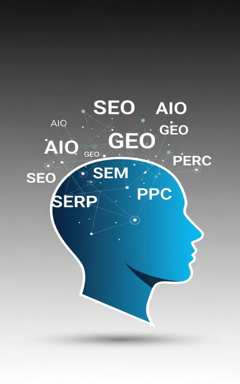The Changing Face of Search Engines and SEO
The realm of search engines and search engine optimisation (SEO) is perpetually in flux. As technology advances and user behaviour evolves, so too must our comprehension and approach to search. This thought piece investigates key trends shaping the future of search and their implications for SEO practitioners.
1. The Ascent of AI and Machine Learning:
Artificial intelligence (AI) is swiftly transforming search engines. From natural language processing (NLP) to machine learning algorithms, AI is driving more intuitive and personalised search experiences. Search engines are improving their ability to grasp the intent behind queries, deliver contextually relevant results, and even predict user requirements.
Implications for SEO:
Emphasis on User Intent: Comprehending the "why" behind a search query takes precedence. Keyword stuffing is no longer sufficient; content must address the user's specific needs and offer value.
Semantic Search: Optimising for long-tail keywords and conversational queries becomes vital. Content should be structured and written in a natural, informative manner that aligns with how users speak and search.
Data-Driven Insights: AI-powered analytics tools furnish deeper insights into user behaviour and search patterns. Employing this data to guide content strategy and optimisation is essential.
2. The Transition to Visual and Voice Search:
Visual and voice search are garnering momentum, propelled by advancements in image recognition and voice assistants. Users are progressively searching through images and voice commands, unlocking new avenues for engagement.
Implications for SEO:
Image Optimisation: Optimising images with pertinent alt text, captions, and file names becomes crucial for visibility in image search results.
Voice Search Optimisation: Content needs to be structured in a conversational and informative style, mirroring how users pose questions through voice assistants.
Structured Data and Schema Markup: Utilising structured data and schema markup assists search engines in understanding the content and providing richer snippets in search results, boosting visibility and click-through rates.
3. The Significance of User Experience (UX):
Search engines are increasingly prioritising user experience as a ranking factor. Websites that are swift, mobile-friendly, and effortless to navigate will hold an advantage.
Implications for SEO:
Technical SEO: Guaranteeing website speed, mobile responsiveness, and technical SEO best practices becomes indispensable for user experience and search engine visibility.
Content Quality and Relevance: Delivering high-quality, informative, and engaging content that satisfies user needs is paramount for attracting and retaining visitors.
User Interface (UI) Design: A user-friendly interface with clear navigation, intuitive design, and accessible features enhances the overall user experience.
4. The Rise of Zero-Click Searches:
Search engines are progressively providing answers and information directly within search results pages (SERPs), resulting in "zero-click searches." Users may discover what they require without ever clicking through to a website.
Implications for SEO:
Featured Snippets and Rich Results: Optimising content to appear in featured snippets, knowledge panels, and other rich results becomes indispensable for visibility and brand awareness.
Content Diversification: Exploring content formats beyond conventional text, such as videos, infographics, and interactive elements, can augment the chances of appearing in SERP features.
Building Brand Authority: Establishing your client's brand as a reliable source of information and expertise can facilitate content appearing in featured snippets and knowledge panels.
Conclusion:
The search landscape is in constant evolution. To remain competitive, SEO professionals must adopt a holistic approach that prioritises user intent, leverages AI and data insights, optimises for new search modalities, and concentrates on delivering exceptional user experiences. By adapting to these shifts, we can ensure our clients' websites maintain visibility, relevance, and value in the ever-changing search environment.








